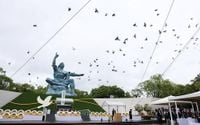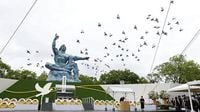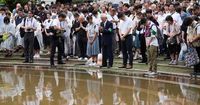On August 9, 2025, the city of Nagasaki paused to remember a moment that changed the course of history. At precisely 11:02 a.m., a bell tolled and thousands of people bowed their heads in silence, marking 80 years since the U.S. dropped a plutonium bomb—nicknamed "Fat Man"—over the southern Japanese city. The attack, which came just three days after the bombing of Hiroshima, killed an estimated 70,000 people in Nagasaki by the end of 1945 and left deep scars that have yet to fully heal.
The commemorative event, held at Nagasaki Peace Park, drew about 2,600 attendees, including representatives from more than 90 countries, according to Kyodo News and the Associated Press. This year, the city extended invitations to all nations with diplomatic missions in Japan, a gesture toward inclusivity after last year’s controversy when several Western envoys, including the U.S. ambassador, were absent in response to the city’s refusal to invite Israeli officials. Russia and Israel, both excluded in 2024, were expected to attend this time, while China declined without giving a reason.
As rain pattered on umbrellas and origami cranes, survivors—known in Japan as hibakusha—and their families gathered at Peace Park and the nearby Hypocenter Park, the very spot where the bomb detonated. They paid their respects with flowers, prayers, and silent reflection. For many, the day was not just about looking back, but also about urging the world to look forward.
"Even after the war ended, the atomic bomb brought invisible terror," 93-year-old survivor Hiroshi Nishioka told those assembled, recalling how many who survived the initial blast suffered later from bleeding gums, hair loss, and ultimately, death. "Never use nuclear weapons again, or we're finished," he warned, his words echoing across generations and borders, as quoted by the Associated Press.
Mayor Shiro Suzuki, whose own parents survived the bombing, addressed the crowd with a somber reminder: "The existential crisis of humanity has become imminent to each and every one of us living on Earth." He described the memory of Nagasaki’s destruction as "a common heritage and should be passed down for generations" both in Japan and around the world. Suzuki called on global citizens to work hand-in-hand for "the abolition of nuclear weapons and the realization of everlasting world peace." After his speech, dozens of doves—symbols of hope and peace—were released into the gray sky, a tradition that never fails to move those present.
This year’s ceremony also featured the ringing of the twin bells from Urakami Cathedral, destroyed in the blast. For the first time since 1945, both bells rang together, after one that had gone missing was restored by volunteers. The sound resonated with special meaning for Nagasaki’s Catholic community, whose ancestors had endured centuries of persecution in Japan’s feudal era and whose faith endured even as the cathedral was reduced to rubble.
Prime Minister Shigeru Ishiba reaffirmed Japan’s decades-long stance of not possessing, producing, or permitting the introduction of nuclear weapons, promising to "lead global efforts to bring about a world without nuclear war and a world without nuclear weapons." Yet, as noted by Deutsche Welle and Kyodo News, Ishiba did not address Japan’s controversial refusal to sign or even observe the Treaty on the Prohibition of Nuclear Weapons. The government argues that, as an ally of the United States, it must rely on the U.S. nuclear umbrella for deterrence—a position that frustrates many survivors and activists.
Survivors like Fumi Takeshita, 83, have made it their mission to keep the lessons of Nagasaki alive. "There are only two things I long for: the abolition of nuclear weapons and prohibition of war," she said, according to AP. Takeshita regularly visits schools to share her story with children, urging them to consider their own role in preventing future wars. "When you grow up and remember what you learned today, please think what each of you can do to prevent war," she told a classroom earlier in the week.
The urgency to preserve these memories grows sharper each year. The number of living survivors has dwindled to about 99,130, with their average age now exceeding 86. Many, like Teruko Yokoyama, 83, are haunted by the knowledge that the youngest hibakusha were too young to remember the horror firsthand. "We must keep records of the atomic bombing damages of the survivors and their lifetime story," Yokoyama said, as reported by AFP. Her organization has begun digitizing survivor testimonies, sharing them on YouTube and other social media platforms with the help of younger volunteers. "There are younger people who are beginning to take action," she told AP. "So I think we don’t have to get depressed yet."
To further encourage intergenerational dialogue, Nagasaki hosted a "peace forum" on the eve of the anniversary, where more than 300 young people from across Japan listened to survivors recount their experiences. Seiichiro Mise, a 90-year-old survivor, described the event as a way of handing "seeds of flowers of peace" to the next generation, hoping to see them blossom in a world free of nuclear weapons.
But the path to disarmament remains fraught. Survivors and many citizens are frustrated by what they see as backsliding on nuclear issues worldwide, with some international leaders arguing that nuclear weapons remain necessary for deterrence. The Japanese government’s position—that U.S. nuclear protection is essential—remains a sore point for many who endured the bombings.
Prime Minister Ishiba did, however, pledge to promote dialogue between nuclear and non-nuclear states at the upcoming Non-Proliferation of Nuclear Weapons (NPT) review conference, scheduled for April and May 2026 in New York. In a message read by Under-Secretary-General Izumi Nakamitsu, U.N. Secretary-General António Guterres called for nations to "move from words to action by strengthening the global disarmament regime," with the NPT at its core, complemented by the momentum of the nuclear weapons ban treaty.
The shadow of Hiroshima also loomed large over the day’s events. Earlier in the week, Hiroshima marked its own 80th anniversary, remembering the 140,000 who perished in the uranium blast and the devastation that flattened most of the city. The bombings of Hiroshima and Nagasaki remain the only two instances of atomic weapons being used in warfare, and their legacy continues to shape global debates on war, peace, and the future of humanity.
For survivors like Koichi Kawano, 85, who laid flowers at the hypocenter monument, the message is simple: "I simply seek a world without war." It’s a hope that resonates far beyond Nagasaki, echoing through the decades and challenging each new generation to remember, reflect, and act.



